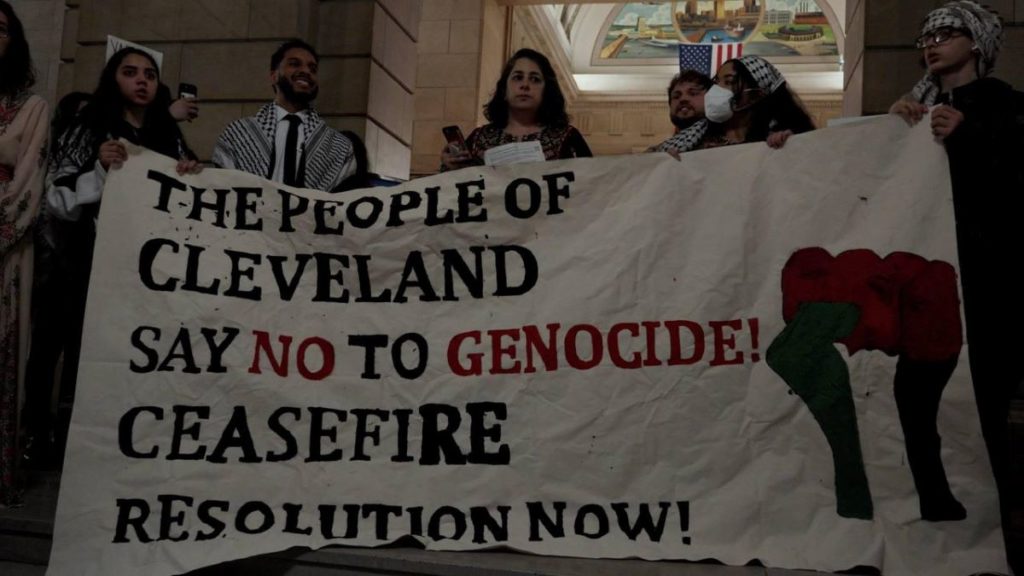On March 4, the people of Cleveland took over the atrium of City Hall during a regular City Council meeting to pass a people’s ceasefire resolution, after the City Council repeatedly refused to introduce a resolution calling for an end to the killing in Gaza.
Since Oct. 7, 2023, there have been 15 Cleveland City Council meetings. These meetings have been attended by members of the Cleveland Palestinian Advocacy Community — a coalition which includes local members of the Party for Socialism and Liberation, Palestinian Youth Movement, Palestinian Existence for Peace Society, the Council on American-Islamic Relations, Jewish Voices for Peace and many more — asking their city council to pass a resolution calling for a ceasefire in Gaza.
Since October, more than 35,000 Palestinians, and perhaps as many as 200,000, have been killed by the Zionist occupation forces. Yet the Cleveland City Council has refused to allow the introduction of a resolution that demands an end to this killing.
On March 4, the people of Cleveland took matters into their own hands. During the regular Council meeting, representatives of the people of Cleveland came together to pass a ceasefire resolution. These representatives did not meet in the Council Chambers, behind ornate wooden banisters and sitting in plush leather chairs. Instead, having been ejected from the cold, marble atrium of City Hall, they gathered on the wide staircase in the front of the building.
On those steps, a resounding chorus of “aye” brought Cleveland into the fold of cities who have passed a ceasefire resolution — whether the elected City Council agreed or not.
“This week represented a change of tactics,” said Dallas Eckman, an organizer from PSL working with CPAC. “In direct defiance of [Council President] Blaine Griffin’s declaration that Council could only pass an ‘unbiased’ resolution; simply put, there is no such thing.”
In the weeks leading up to March 4, organizers at CPAC determined that the elected Council had lost its mandate to power. The people would need a new Council to put the interest of citizens first. Instead of calling on demonstrators to pack the City Council meeting for a 15th straight week, the coalition organized a new type of Council — a People’s Council. Chance Zurub, an organizer with PYM, said the intent of the People’s Council was to show City Council, “that the people of Cleveland are the decision makers and have collective power, condemn genocide and stand with Palestine.”

As people passed through the security process, members of the People’s Council began to take up the space in the central atrium of City Hall, instead of taking the stairs to City Council chambers. They sat on the floors and tables around the space and began to chant “City council we won’t tire! We demand a ceasefire!” The chanting continued, in English and Arabic, as more and more members of the public filed into the atrium, taking their place in whatever space remained.
It became apparent within minutes that the authorities would not stand for such a large gathering in the halls of power. Police began ringing the crowd and surveilling from the second floor banisters. Before long, a white-shirted lieutenant got on a bullhorn and tried to read a statement. While it was impossible to hear him through the din of “Free, free, free Palestine,” the message was clear: the public was not welcome in the halls where their supposed representatives governed. “It has become clear and evident that [they] do not uphold First Amendment values,” said Zurub of the police aggression.
The CPAC organizers, in an attempt to maintain the peace and safety of all those in attendance (which included families with children), acquiesced to the police’s demands. But they would not be silenced — they simply moved the meeting of the People’s Council to the front steps. And so the People’s Council of Cleveland did its business in the open air.
The first meeting of the People’s Council began with congratulatory and condolence resolutions, and a moment of silence for the martyrs. Speeches were given condemning the City Council for its refusal to heed the will of the people, and for the city government’s corruption across all areas of public life.
Finally, the People voted “aye” in a decisive, single voice to suspend the rules in order to pass an emergency resolution. The People’s Ceasefire Resolution was read aloud in full. The first section begins by asserting that the “people of Cleveland take it upon themselves to represent this city, and affirm that Cleveland stands with Palestine and all oppressed people.” The People’s Council then passed the resolution unanimously by verbal vote.
After its historic vote, the People’s Council closed its business for the day. The festivities afterward included dancing and music, a joyful gathering of people who had been attending Council meeting for weeks on end in hopes of some measure of justice. It was “a beautiful indication of what is possible,” said Shereen Naser, an organizer with CPAC. “I hope it inspires Cleveland City Council to remember what we as Clevelanders are capable of when we step out of these prescribed political roles and think about people: not profits, not political careers, but people.”
The Coalition will continue its work. A regional boycott, divestment and sanctions campaign and direct political opposition to incumbent members of the City Council are the next steps. “If [City Council] feels unable to openly denounce genocide … because they see it as a foreign issue,” said Naser, then “it should be easy to pass a resolution reinvesting Cleveland money towards Cleveland businesses,” rather than spending Cleveland tax payer dollars with Israeli companies.
Feature photo: Members of the Cleveland People’s Council take over the atrium at City Hall. Liberation photo





